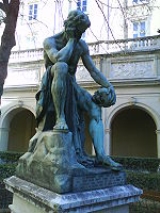
460 BC – ca. 370 BC) was an Ancient Greek philosopher born in Abdera, Thrace
, Greece
. He was an influential pre-Socratic philosopher
and pupil of Leucippus
, who formulated an atomic theory
for the cosmos.
His exact contributions are difficult to disentangle from his mentor Leucippus, as they are often mentioned together in texts. Their speculation on atoms, taken from Leucippus, bears a passing and partial resemblance to the nineteenth-century understanding of atomic structure that has led some to regard Democritus as more of a scientist than other Greek philosophers; however their ideas rested on very different bases.
We know nothing accurately in reality, but [only] as it changes according to the bodily condition, and the constitution of those things that flow upon [the body] and impinge upon it.![]()
Medicine heals diseases of the body, wisdom frees the soul from passions.![]()
Coition is a slight attack of apoplexy. For man gushes forth from man, and is separated by being torn apart with a kind of blow.![]()
Man is a universe in little [Microcosm].![]()
Good breeding in cattle depends on physical health, but in men on a well-formed character.![]()
Many much-learned men have no intelligence.![]()
Immoderate desire is the mark of a child, not a man.![]()
[I would] rather discover one cause than gain the kingdom of Persia.![]()
Men have fashioned an image of Chance as an excuse for their own stupidity. For Chance rarely conflicts with intelligence, and most things in life can be set in order by an intelligent sharpsightedness.![]()

